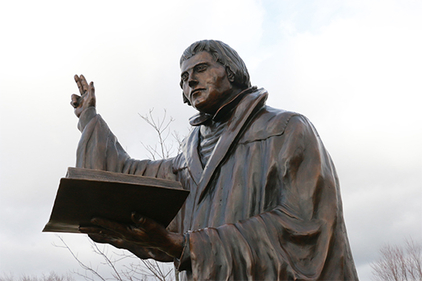ABORTION SUPPORTERS were quick to link the cold-blooded murder of Barnett Slepian, the New York abortion doctor, to "hate speech" from the prolife mainstream. On the CBS Evening News last week, Dan Rather raised the charge that "rhetoric from the antiabortion movement is helping to incite this kind of murderous violence." A New York Times editorial warned, "Frequent accusations by some antiabortionists that abortion providers are committing murder can only fuel more terrorism."
It is a vile form of guilt by association to blame decent if passionate prolifers for the awful crimes of a fanatic on the fringe. But it has become routine. When John Salvi killed two abortion clinic employees in Brookline on the last day of 1994, the Planned Parenthood spokesman promptly censured the "inflammatory rhetoric" of abortion opponents for having "fostered this climate." Hissed the National Organization for Women: "The National Right to Life Committee, the Pro-Life Action League and Operation Rescue . . . are responsible for these shootings." Slepian himself vented the same harsh accusation. "These nonviolent people who are clasping their rosaries," he said then, ". . . bear some responsibility for the violence."
It isn't only in the context of abortion that such charges are made. When Matthew Shepard was beaten to death in Wyoming, the "homophobia" of anyone who disapproves of homosexuality was blamed for the atrocity. The dragging death of James Byrd was the fault, in part, of "racism" from those who oppose racial preferences. The terrorist attack on the federal building in Oklahoma City? That was laid to "extremism" from the new Republican leaders in Congress and conservative radio hosts who criticize the government.
It amounts to a kind of intellectual blackmail: Keep your opinions to yourselves, the Left threatens its critics, or we will condemn you and your "hate speech" for encouraging homicide. (The bullying is almost always one-way — conservatives did not indict environmentalists for the crimes of the Unabomber, or hold antiwar protesters liable for the murders of the Weather Underground.) But that is not the worst of it. Those who play the hate-speech card as a way of demonizing those they disagree with are not only poisoning public discourse, they are trivializing the power of speech that truly is lethal.
 "Burn down their synagogues," raged Martin Luther, the seminal figure of the Protestant Reformation. "We must drive them out like mad dogs, so we do not become partakers of their abominable blasphemy and all their other vices." |
This is a good month to reflect on the toxicity of words meant to kill.
Nov. 9 marks the 60th anniversary of Kristallnacht, the 1938 "Night of Shattered Glass" unleashed by the Nazis to terrorize Germany's Jews. The date was chosen specially by Josef Goebbels, Hitler's propagandist, to honor the birthday of Martin Luther, the 16th century monk who was a father of the Protestant Reformation and the founder of what became the Lutheran church.
Hitler greatly admired Luther: "He saw the Jew as we are only beginning to see him today." Indeed. Luther saw the Jews as "hopeless, wicked, venomous, and devilish . . . our pest, torment, and misfortune." Initially certain that his version of Christianity would appeal to Jews, he expected large numbers of them to convert. When that failed to happen, he turned violently against them. In 1543, Luther published "On the Jews and Their Lies," perhaps the most widely disseminated work of antisemitism by a German until the rise of the Nazis 400 years later.
"What then shall we Christians do with this damned, rejected race of Jews?" Luther asked.
"First, their synagogues should be set on fire, and whatever does not burn up should be covered or spread over with dirt, so that no one may ever be able to see a cinder or stone of it. . . .
"Secondly, their homes should likewise be broken down and destroyed. . . .
"Thirdly, they should be deprived of their prayer-books and Talmuds, in which such idolatry, lies, cursing, and blasphemy are taught.
"Fourthly, their rabbis must be forbidden under threat of death to teach any more. . . .
"Fifthly, passports and traveling privileges should be absolutely forbidden to the Jews. . . .
"Sixthly, I advise that . . . all cash and treasure of silver and gold be taken from them. . . .
"Burn down their synagogues, forbid all that I enumerated earlier, force them to work, and deal harshly with them. . . . If this does not help we must drive them out like mad dogs, so we do not become partakers of their abominable blasphemy and all their other vices. I have done my duty. Now let everyone see to his."
That is hate speech.
Sixty years ago next Monday, on the night of Luther's birthday, Nazi gangs rampaged across Germany. In every Jewish neighborhood, windows were smashed and buildings were torched. All told, 101 synagogues were destroyed, and nearly 7,500 Jewish-owned business were demolished. On that night, 91 Jews were murdered; 26,000 more were rounded up and sent to concentration camps. It was the greatest pogrom in history. And it was nothing compared with what was to come.
Yes, words can kill. There is such a thing as deadly rhetoric, and its effects can be long-lived and murdereous. But one is not guilty of lethal hate speech merely for voicing an opinion that Dan Rather or Planned Parenthood don't share. The assassination of Dr. Slepian was bad enough. No one should use his death as an excuse to slander others.
(Jeff Jacoby is a columnist for The Boston Globe).
-- ## --
Follow Jeff Jacoby on Twitter.
Discuss his columns on Facebook.
Want to read more? Sign up for "Arguable," Jeff Jacoby's free weekly email newsletter.

